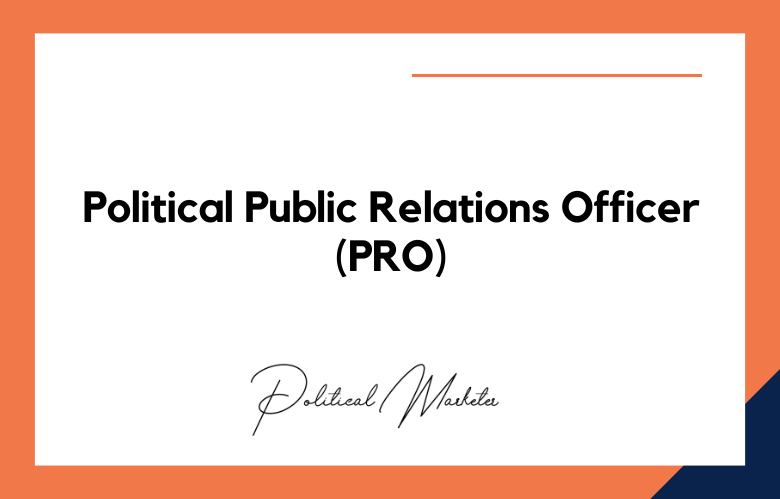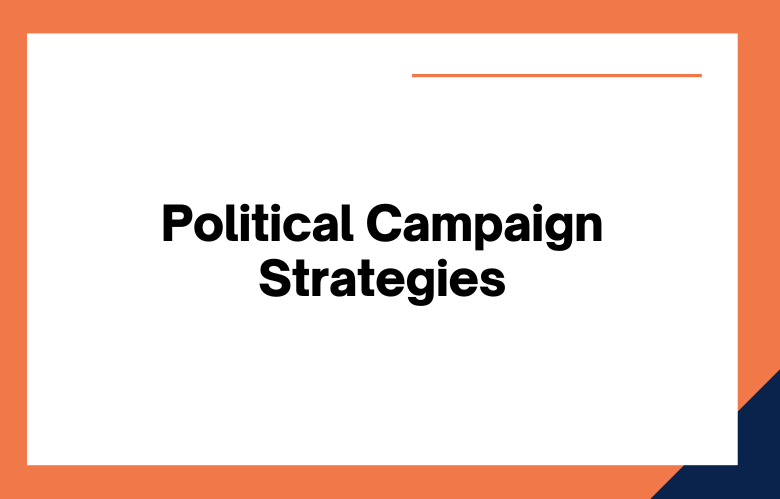Political campaigns require a well-planned strategy that includes using different media outlets. One is news media, which is crucial in shaping political opinions and providing voters with accurate information about the candidates.
From reporters to social media managers, political campaigns require professionals with experience and expertise in various aspects of news media. We’ll take a closer look at the different types of news media professionals for political campaigns.
How many Types of News Media Professionals for Political Campaigns
Reporters and Correspondents:
Reporters and correspondents are professionals on the front lines of news media. They cover political campaigns daily and report on different events related to the campaign. They interview the candidates, cover their speeches, and provide news updates to the media outlet they work for. These professionals often work for newspapers, TV channels, or online news portals.
Social Media Managers:
Social media has revolutionized the way political campaigns are run. Nowadays, social media managers play a significant role in shaping political opinions. They create content, manage social media accounts, and advertise paid campaigns. They target specific demographics and ensure that the content reaches the right audience.
Production Personnel:
Production personnel include camera operators, video editors, and sound technicians, who ensure that all the video content related to the political campaign is high quality. These professionals work closely with reporters and correspondents and ensure that the videos are edited and produced on time.
Public Relations Specialists:
Public relations specialists are responsible for developing a positive image of the candidate they represent. They create press releases, arrange interviews, and manage media relations. Their goal is to ensure that the candidate stays in the news and is perceived positively by the public.
Political Analysts:
Political analysts are experts in political science who analyze political trends, election data, and voter behavior. They work with reporters to provide valuable insights into the political campaign and how it will likely affect the election outcome.
Election survey reporting
As the election season heats up, surveys are being conducted nationwide to gauge public opinion and predict the outcome. These surveys are a vital tool for political strategists, providing crucial insights into the preferences and priorities of different voter demographics.
However, simply reporting the results of these surveys is not enough – we must strive for higher semantic richness and provide more detailed and factual analyses of the data. For example, we can examine how the survey results vary by region, age group, gender, and other factors. This can give us a more nuanced understanding of the political landscape and help us identify key voting blocs.
We can also dig deeper into the methodology used to conduct the surveys, including sample size, sampling techniques, and the questions asked. This can help us assess the accuracy and reliability of the results and identify potential sources of bias or error.
Public Opinion Poll Analysis
Public opinion polls are an essential tool for gauging the attitudes and beliefs of a population toward a particular issue or candidate. In recent years, there has been significant growth in the field of public opinion research. One of the reasons for this is the increasing importance of public opinion in the political decision-making process. Another reason is technological advancements, which have made it easier and cheaper to conduct polls.
Public opinion polls are conducted using various methods, including online, telephone, and in-person interviews. The data collected is then analyzed using statistical techniques to determine the overall sentiments of the population. One of the most critical factors in determining the accuracy of a poll is the sample size. In general, larger sample sizes lead to more accurate results.
Voter interest trends
Voter interest trends are an essential aspect of any democratic society. In recent years, there have been significant changes in the level and nature of voter interest, particularly in the younger generation. Historically, voter turnout among young people has been low, but recent elections have seen a significant increase in their engagement and turnout.
One major factor driving this trend is the growing sense of political polarization and the perception that elections have real consequences for people’s lives. Young voters are increasingly aware of the issues at stake in elections and are motivated to turn out and express their views.
In addition, social media platforms have played an essential role in engaging and mobilizing younger voters. These platforms provide a space for political discourse and offer new opportunities for organizing and mobilizing people around shared causes.
Election cycle surveys
Election cycle surveys gauge public opinion on various political issues and candidates during an election season. These surveys are essential for political campaigns and election organizers to predict outcomes and tailor their messaging accordingly.
One of the most commonly used methods for election cycle surveys is the telephone poll, where a representative sample of registered voters is called and asked questions about their political preferences. Online and in-person interviews are also used, though telephone polling remains the most widely recognized method.
Candidate support surveys
Candidate support surveys are critical tools used in the political arena to gauge public opinion regarding specific candidates. These surveys are typically conducted through various methods, including online polls, phone interviews, and door-to-door canvassing. They aim to collect data to help political campaigns and parties identify their strongholds, areas of weakness, and potential swing voters.
To ensure the accuracy of the results, candidate support surveys are usually conducted using random sampling techniques, where respondents are chosen from a representative sample of the population. The selected demographic groups reflect the electorate’s diversity to avoid bias and ensure that the data collected accurately reflects the voter sentiments.
Political debate impact polls
Political debates are a crucial aspect of modern-day political campaigns. They serve as a platform for candidates to present their ideas and policy proposals to the public while also providing an opportunity for voters to compare and contrast the policies and beliefs of each candidate. However, political debates not only impact the candidates themselves; they can also influence public opinion and, subsequently, electoral outcomes.
One of the most immediate ways political debates can impact polls is through the candidates’ performance. A candidate’s performance in a discussion can boost their popularity and improve their standing in the elections. Conversely, poor performance can lead to a drop in popularity and a decline in poll numbers.
Pre-election poll analysis
Pre-election poll analysis is a crucial aspect of election forecasting that predicts the political outcomes of an upcoming election. It involves collecting and analyzing data on election preferences and voter behavior to make informed predictions about the outcome of an election.
In recent years, pre-election polls have become increasingly popular. Political analysts and journalists often use them to assess the political climate and predict the outcome of an election. These polls typically involve surveys and questionnaires to gauge voter preferences and opinions on various political issues, including candidates’ stances on key policy areas and their attributes.
Voter turnout predictions
Voter turnout predictions are crucial to any election process, as they provide valuable insights into how many people are likely to cast their ballot. These predictions are significant for campaign strategists and candidates, who use them to tailor their messaging and outreach efforts to maximize voter engagement.
In recent years, there has been a growing focus on improving the accuracy of voter turnout predictions. This has been partly driven by advances in data analytics and modeling techniques, enabling more granular and nuanced analyses of voting patterns and behavior.
Election night exit polls
On election night, exit polls are conducted to gather data on voters’ choices after they leave the polling stations. These polls provide crucial insights into voter behavior and demographics. The data is collected using various methods, including door-to-door, telephone, and online surveys.
Exit polls are conducted by independent organizations and are known for their accuracy and reliability. They enable pollsters to project the winner of an election and provide detailed insights into voter behavior and preferences. Critical factors assessed include demographic information, including age, gender, income, education level, ethnicity, voting patterns, and motivations.
Post-election analysis surveys
Post-election analysis surveys are an integral part of any democratic process. These surveys aim to collect information about the voters’ attitudes toward the different political parties and candidates, their reasons for casting their vote, and their perceptions of the election process.
The results of these surveys provide valuable insights into the political landscape of a country. They can help political parties and candidates better understand the needs and wants of their constituents. The data collected from these surveys can be used to identify the strengths and weaknesses of political campaigns and to inform future election strategies.
Conclusion:
Effective news media management is an essential aspect of any successful political campaign. From reporters to social media managers to production personnel and public relations specialists, each professional plays a crucial role in informing public opinion and influencing the election outcome.
Understanding the different types of news media professionals for political campaigns is essential to ensure that the right professionals are utilized to build and sustain a positive campaign image. Hence, working with a team of experienced media professionals who can effectively communicate the candidate’s message and attract potential voters is crucial.
Call: +91 9848321284
Email: [email protected]
How Many Types of News Media Professionals for Political Campaigns: FAQs
What Is The Role Of A Political Journalist During A Campaign?
Political journalists report on candidates, campaigns, policies, and controversies to keep the public informed and hold power accountable.
How Do Media Strategists Support Political Campaigns?
Media strategists craft narratives, place ads, and coordinate with outlets to shape public opinion in favor of the candidate.
What Does A Political Commentator Do?
A political commentator offers expert opinions and analysis on political events through television, print, or online platforms.
Why Are Press Secretaries Important In Campaigns?
They serve as the campaign’s official voice, managing media interactions and shaping public communication.
What Is The Function Of A Broadcast News Producer In Elections?
They oversee political coverage, decide what gets airtime, and manage the flow of election-related content on TV or radio.
How Do News Anchors Influence Political Coverage?
Anchors present stories to the public, often adding tone, emphasis, or context that influences voter interpretation.
Who Are Political Correspondents?
Political correspondents are specialized reporters who cover elections, policy, and government actions extensively and consistently.
How Do Digital Content Creators Impact Political Campaigns?
They create videos, memes, infographics, and social media content to help campaigns engage digital-native audiences.
What Role Do Political Media Consultants Play?
They guide the campaign on strategic media placements, narrative framing, crisis control, and press engagement.
How Do Public Relations Officers Help Politicians?
They build and maintain the politician’s public image, manage interviews, and oversee responses to media scrutiny.
What Is The Job Of An Editorial Writer In Political Campaigns?
They publish opinion pieces on candidates or issues, helping sway public sentiment through persuasive writing.
How Does A Photojournalist Contribute To Political Coverage?
They capture visual moments from campaigns like rallies and protests that convey emotion and amplify messaging.
What Is The Role Of Fact-Checkers In Political Reporting?
Fact-checkers verify claims by candidates and the media to ensure the public receives truthful, unbiased information.
What Do Political Podcasters Offer To Campaigns?
They provide a platform for long-form discussions that deepen voter understanding of policies and personalities.
How Do Media Researchers Assist Political Campaigns?
They analyze trends, coverage, and public reaction, helping shape media strategies and prepare candidates.
What’s The Significance Of Editorial Cartoonists In Politics?
Cartoonists use satire and symbolism to critique or support political ideas, shaping opinion through visual commentary.
How Do Social Media Managers Work With Media Professionals During Campaigns?
They ensure consistent messaging across platforms, respond to real-time developments, and build digital engagement.
What Is The Responsibility Of Media Liaisons In A Campaign Team?
They coordinate between journalists and campaign staff, managing interviews, statements, and press credentials.
How Do Columnists Differ From Reporters In Political Media?
Columnists offer subjective views or opinions, while reporters focus on objective coverage of events and facts.
Why Is Collaboration Between Political Campaigns And Media Professionals Vital?
It ensures accurate information flow, supports strategic messaging, and strengthens the campaign’s relationship with voters.









